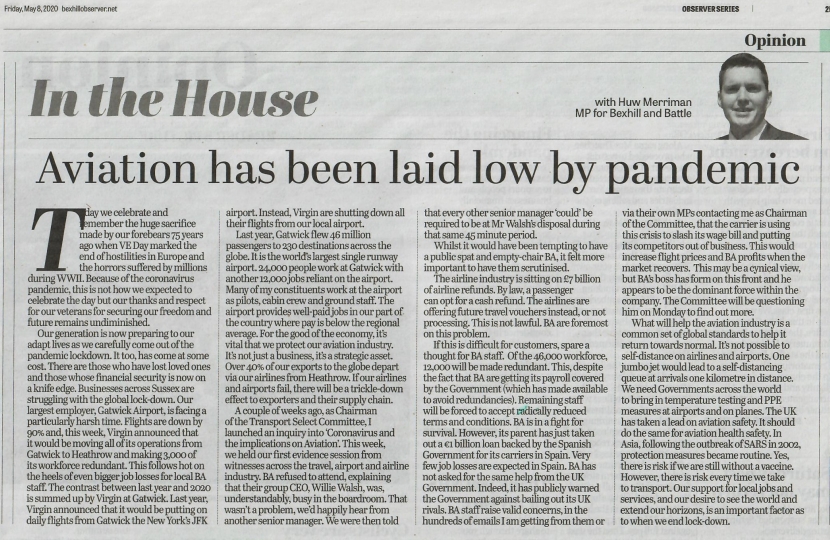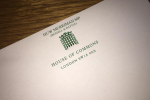
Today we celebrate and remember the huge sacrifice made by our forebears 75 years ago when VE Day marked the end of hostilities in Europe and the horrors suffered by millions during WWII. Because of the coronavirus pandemic, this is not how we expected to celebrate the day but our thanks and respect for our veterans for securing our freedom and future remains undiminished.
Our generation is now preparing to our adapt lives as we carefully come out of the pandemic lockdown. It too, has come at some cost. There are those who have lost loved ones and those whose financial security is now on a knife edge.
Businesses across Sussex are struggling with the global lock-down. Our largest employer, Gatwick Airport, is facing a particularly harsh time. Flights are down by 90% and, this week, Virgin announced that it would be moving all of its operations from Gatwick to Heathrow and making 3,000 of its workforce redundant. This follows hot on the heels of even bigger job losses for local BA staff.
The contrast between last year and 2020 is summed up by Virgin at Gatwick. Last year, Virgin announced that it would be putting on daily flights from Gatwick the New York’s JFK airport. Instead, Virgin are shutting down all their flights from our local airport.
Last year, Gatwick flew 46 million passengers to 230 destinations across the globe. It is the world’s largest single runway airport. 24,000 people work at Gatwick with another 12,000 jobs reliant on the airport. Many of my constituents work at the airport as pilots, cabin crew and ground staff. The airport provides well-paid jobs in our part of the country where pay is below the regional average.
For the good of the economy, it’s vital that we protect our aviation industry. It’s not just a business, it’s a strategic asset. Over 40% of our exports to the globe depart via our airlines from Heathrow. If our airlines and airports fail, there will be a trickle-down effect to exporters and their supply chain.
A couple of weeks ago, as Chairman of the Transport Select Committee, I launched an inquiry into ‘Coronavirus and the implications on Aviation’. This week, we held our first evidence session from witnesses across the travel, airport and airline industry. BA refused to attend, explaining that their group CEO, Willie Walsh, was, understandably, busy in the boardroom. That wasn’t a problem, we’d happily hear from another senior manager. We were then told that every other senior manager ‘could’ be required to be at Mr Walsh’s disposal during that same 45 minute period.
Whilst it would have been tempting to have a public spat and empty-chair BA, it felt more important to have them scrutinised.
The airline industry is sitting on £7 billion of airline refunds. By law, a passenger can opt for a cash refund. The airlines are offering future travel vouchers instead, or not processing. This is not lawful. BA are foremost on this problem.
If this is difficult for customers, spare a thought for BA staff. Of the 46,000 workforce, 12,000 will be made redundant. This, despite the fact that BA are getting its payroll covered by the Government (which has made available to avoid redundancies). Remaining staff will be forced to accept radically reduced terms and conditions.
BA is in a fight for survival. However, its parent has just taken out a €1 billion loan backed by the Spanish Government for its carriers in Spain. Very few job losses are expected in Spain. BA has not asked for the same help from the UK Government. Indeed, it has publicly warned the Government against bailing out its UK rivals.
BA staff raise valid concerns, in the hundreds of emails I am getting from them or via their own MPs contacting me as Chairman of the Committee, that the carrier is using this crisis to slash its wage bill and putting its competitors out of business. This would increase flight prices and BA profits when the market recovers. This may be a cynical view, but BA’s boss has form on this front and he appears to be the dominant force within the company. The Committee will be questioning him on Monday to find out more.
What will help the aviation industry is a common set of global standards to help it return towards normal. It’s not possible to self-distance on airlines and airports. One jumbo jet would lead to a self-distancing queue at arrivals one kilometre in distance. We need Governments across the world to bring in temperature testing and PPE measures at airports and on planes. The UK has taken a lead on aviation safety. It should do the same for aviation health safety. In Asia, following the outbreak of SARS in 2002, protection measures became routine. Yes, there is risk if we are still without a vaccine. However, there is risk every time we take to transport. Our support for local jobs and services, and our desire to see the world and extend our horizons, is an important factor as to when we end lock-down.



